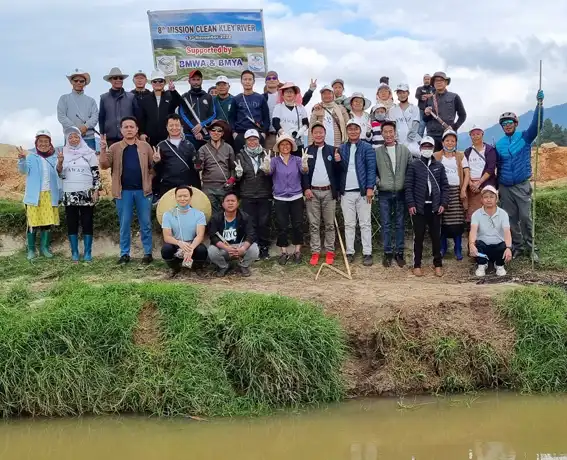Save lone river from dying: DC
ZIRO, 13 Nov: “Unlike other districts in the state, Ziro valley is bestowed with the lone, small Kley river, and it is our prime duty to save it from choking and dying,” said Lower Subansiri Deputy Commissioner Bamin Nime while participating in the 8th Mission Clean Kley River (MCKR) here in Lower Subansiri district on Sunday.
The DC urged the people of the district to keep the Kley clean and not throw wastes into the river.
“Kley is our only river which runs through the length and breath of our valley, and we should make every effort to conserve it and keep it clean in order to be able to use the water and to increase the aesthetic beauty of our valley,” he said.
The 24-km-long Kley river runs through Hapoli and Ziro, and touches a few villages of the valley, as well. The Apatani Youth Association (AYA) initiated MCKR in 2015 to clean the river on 13 November with help and support from the district administration, NGOs and schoolchildren. Since then, MCKR has become an annual calendar event.
This year, around 3,000 persons, including members of the Tani Supun Dukun, the Apatani Women Association of Ziro (AWAZ), the Bazaar Welfare Committees, members of NGOs, officials of all the departments, and school and college students participated in the cleanliness drive.
“We need to come up with more innovative methods to keep our Kley river clean. I also urge the district administration to take punitive action against those defaulters who dirty the river,” said AYA president Tapi Mali. He added that “maintaining the cleanliness of the river should be entrusted to respective denizens of the areas in which the river flows,” and appealed to the public to imbibe civic sense and not dump garbage into the river.
AWAZ president Hibu Yapa Lilly appealed to the women not to dump sanitary napkins, diapers and plastic items into the river. “I also appeal to our women farmers not to dispose of plastic items into the river but to carry back the leftover plastic items from paddy field back to their homes for proper disposal,” she said.
The participants picked up several tons of garbage from their respective sectors. The garbage was later picked up by garbage disposal vans of the urban development & housing department and dumped at the designated dump sites. (DIPRO)



